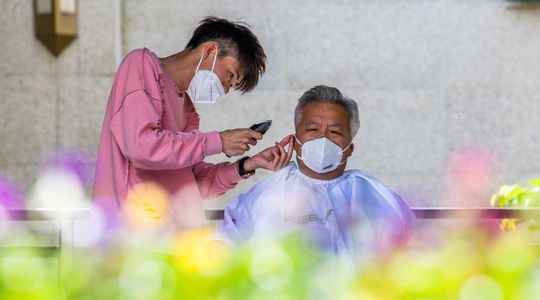North of Beijing, in a house that looks like an old Buddhist temple, Dr. Bai’s clinic is one of 50,000 traditional medicine centers in the country. In small wooden drawers are stored mysterious fragrant medicinal plants, which will then be weighed to the nearest gram and added to mixtures of insects, fungi or roots. Since the Covid-19 epidemic, the place has not been empty. Among the visitors, many elderly people who believe more in the virtues of plants and traditions than in those of vaccines. “I’ve been treating myself for years with traditional medicine, it’s enough and above all it’s less harmful to my body”, says a regular of almost 80 years, whom a doctor refused to vaccinate because of her health problems. health.
The attraction for this ancestral care is not the only reason for the low vaccination coverage of the elderly. While 80% of Chinese over 60 have received two injections, according to figures from the National Health Commission for May 2022, only 60% have received a booster – compared to 88% for the rest of the population. population. The older people get, the less they get vaccinated: in mid-March, only half of those over 80 had their two doses. “Vaccines are not effective, launches a 68-year-old Pekingese. Look, even vaccinated people can get sick, it’s not a guarantee! In addition, if I have a fever or pain because of the vaccine , I might end up in the hospital.” The fear of all, because the risks of contagion will increase further.
Priority to assets for vaccination
Unlike many Western countries like France, which prioritized the elderly and immunocompromised groups, China initially offered vaccination only to working people aged 18 to 59, considered most likely to spread the virus. virus. The official objective of the authorities being to “prevent imported cases and national resurgences”, the first to be vaccinated were therefore customs and airport employees, taxi drivers, delivery people… In most cities, it will therefore have been necessary to wait until June 2021 for those over 60 to have access to the vaccine. An initial choice that left its mark on people’s minds.
The case of Hong Kong, where the low vaccination coverage of seniors has had dramatic effects, should however make the government think. There, 95% of Covid deaths are people over 60 who were not fully vaccinated. “Until the elderly, who are the most vulnerable, are better protected, there will be no herd immunity,” said Jin Dongyan, one of Hong Kong’s most renowned virologists.
Problem, only two vaccines are authorized in the country, those of the Chinese laboratories Sinovac and Sinopharm. However, without a third dose, their effectiveness remains very limited. “If we really care about people’s lives and health, we should approve the import of messenger RNA vaccines like Pfizer as soon as possible,” said Jin Dongyan. But no question for China to be dependent on a foreign serum, it is about national pride.
“The decision not to launch national compulsory vaccination programs also adds to distrust,” said Wang Guisong, professor of law at Renmin University in Beijing. In addition, before the pandemic, quality and corruption scandals had repeatedly shaken confidence in China’s vaccine industry, raising fears of side effects from faulty serums. The oldest have not forgotten.
“A lot of people think it’s useless”
China is therefore relying on its good old recipes: containment, tracing and compulsory screening. In Beijing, tens of thousands of tents hosting free screening centers have been set up. “I come every morning as soon as it opens, says a retiree. It’s important to protect our community. The man wears the red armband of the neighborhood committees: “I have been a member of the Communist Party since 1968, I was 20 years at the time, he states proudly. After my test, I sit at the entrance of my residence to control the comings and goings.” Asked if he is vaccinated, he replies: “No, I have heart problems, everyone everyone advises me not to get vaccinated. This is for young people, those who work.”
A timid campaign to encourage vaccination was relaunched on posters. Like last year, neighborhood town halls offer eggs, rice and other foodstuffs in exchange for an injection. But nothing compulsory, no vaccination pass like in France. “A lot of people think it’s useless, blows a resident. We still have to get tested every day, we are subject to the same constraints as everyone else.”
The new Omicron wave could in theory encourage the authorities to review their strategy and push for the vaccination of some 264 million Chinese over the age of 60. “But for that, a real revolution of minds would be needed, underlines a scientific expert from a European embassy. Many regime executives prefer to stick to the methods applied for two years, even if it is a disaster for the economy. If some proposed another approach, they would take the risk of failure with consequences for their career. Imagine that vaccination is imposed and that elderly people die of a disease, even unrelated to the vaccine: there is would have terrible protests. In China, you don’t push the elderly.”
